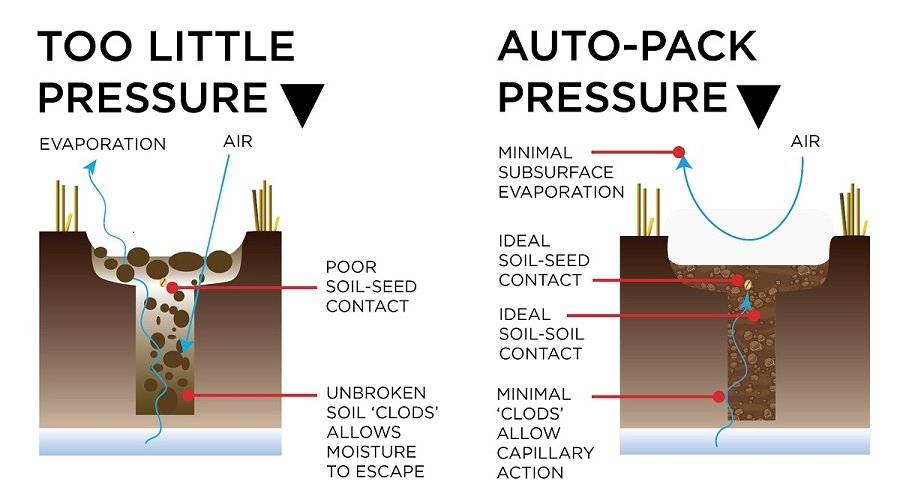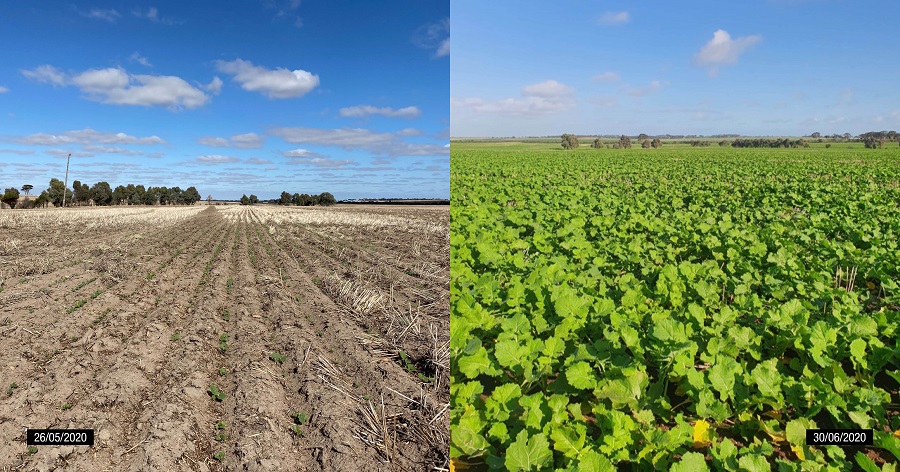

01 October 2020
AT A GLANCE
AT 55 years of age, Duncan Murdoch has been around tillage and seeding gear long enough to recall some of the major revolutions in the industry – and he believes we’re on the cusp of another one.
Duncan has worked with manufacturers, in sales of ground engaging implements at the farmgate, and today supports the Morris range of tillage and seeding products for national distributor, McIntosh Distribution.
 Photo 1: Auto-Pack Diagram
Photo 1: Auto-Pack Diagram
“Since I was a kid, we have had several revolutions in seeding bars,’’ Duncan said.
“In the very early days, we had the shift from combines to cultivator bars and air seeders.
“Then we had to make the bars reliable – cracked frames, poor hydraulics and poor flotation were commonplace. Then we made them wider and made them handle more trash. Finally, we got the air kits working properly, we got the bars to seed at the right depth, and we got them to dig.’’
He said the industry, however, was about to take the next major step, and that was variable pressure packing with Auto-Pack, a technological breakthrough made possible via new live hydraulics.
“Auto-Pack allows operators to set the desired packing pressure on press wheels and then it maintains it constantly by varying the hydraulic pressure on the opener assembly as soil conditions change across paddocks.’’
“We all know correct packing pressure is critical for effective soil-seed contact and establishing capillary action to draw moisture up from deeper in the soil profile to the seedbed.
“This requires different packing pressures in different soil conditions. Too much packing pressure in dry sands or wet clays can result in surface sealing, hindering germination. Too little packing pressure in dry clays or loams won’t press out the soil clods sufficiently to close the furrow, exposing any available soil moisture to evaporation. Not pressing out the clods also reduces soil-seed contact and limits capillary action.
“Auto-Pack creates the most ideal seed germination environment possible. Correctly closed and packed furrows reduce the risk of the available moisture bank evaporating, which is now recognised as critical, particularly with the shift to dry seeding.’’
The new technology was first seen on the Morris Quantum air drills and is now available with the latest release 80-foot (24-metre) and 90ft (27m) Morris C3 Contour drills. These also feature Morris’ renowned parallel linkage with the 1:1 opener to packer ratio, ensuring precise depth control and ground following.
Duncan said progressive growers already were quickly understanding and recognising the benefits of variable pressure packing with Auto-Pack.
 Photo 2: Pictured left south of Corrigin shows emerging canola plants after seeding on May 20 with a Morris Quantum drill set on 25-centimetre spacings and with Auto-Pack variable pressure packing, and the excellent establishment that followed, pictured right, on July 1. The canola crop did not receive any follow-up fertiliser and 70-80 millimetres of rainfall was recorded from May 20 to July 1.
Photo 2: Pictured left south of Corrigin shows emerging canola plants after seeding on May 20 with a Morris Quantum drill set on 25-centimetre spacings and with Auto-Pack variable pressure packing, and the excellent establishment that followed, pictured right, on July 1. The canola crop did not receive any follow-up fertiliser and 70-80 millimetres of rainfall was recorded from May 20 to July 1.
“They have commented that nothing gets a crop out of the ground quite like it on virtually no moisture at all,’’ he said.
The Morris Quantum and C3 drills not only prepare an ideal root zone for germinating seed, but the correctly packed furrow maximises any subsoil moisture via capillary action and further improves depth control.
“Every square inch gets up and crops then get to two to three-leaf quickly and evenly, compared with some paddocks ‘over the fence’ that still haven’t germinated.’’
Meanwhile, air kits also have been further advanced, with an Australian-made design available with the latest Morris drills allowing easier configuration with bars, which helps achieve the best product delivery possible.
The high-end kits comprise extensive use of stainless steel, allowing the lowest levels of friction, thereby significantly reducing the energy requirement to move product through the system. Stainless steel also improves resistance to wear and corrosion.
Fully integrated blockage monitoring systems also have been further developed in Australia to suit each Morris Quantum and C3 drill. These blockage systems are reliable, section aware for those farmers using Input Control Technology (ICT) for section control, and do not require doubling up on monitors or harnessing.
“What we are offering is the complete, integrated package for growers. It’s been tested and the Auto-Lift, Auto-Pack, ICT and blockage monitoring all work together on one screen, keeping tractor cab layout and vision at an optimum,’’ Duncan said.
For further information about variable pressure packing with Auto-Pack, the latest air kits and blockage monitoring kits, growers can contact their nearest Morris dealer.